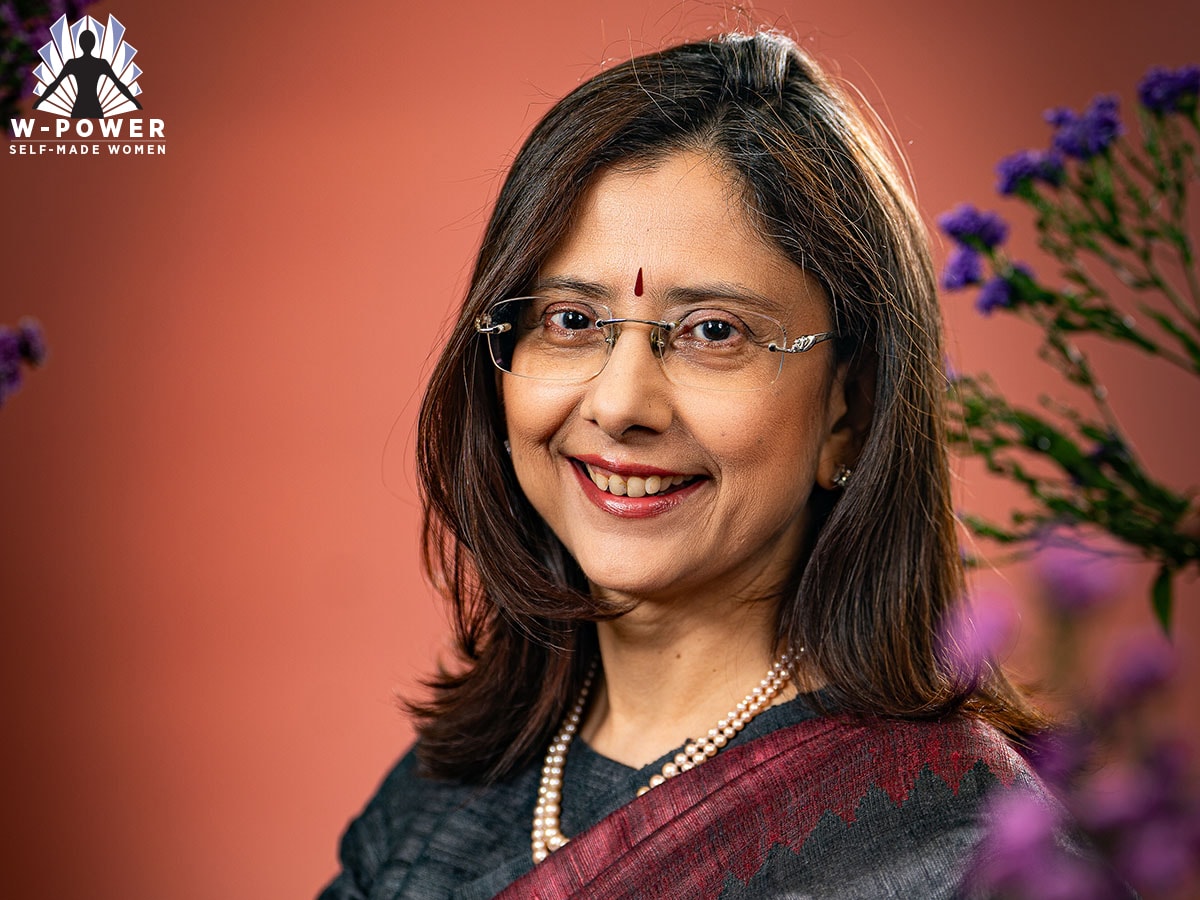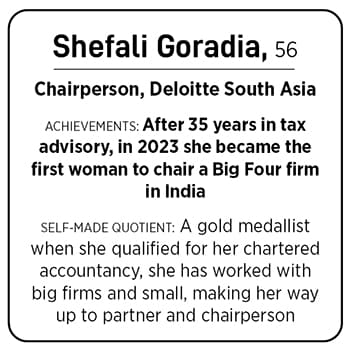 Shefali Goradia, Chairperson, Deloitte South Asia
Shefali Goradia, Chairperson, Deloitte South Asia
Image: Mexy Xavier
Shefali Goradia’s gold medal when she qualified as a chartered accountant meant an open invitation to interview with the top accounting firms. She joined Arthur Andersen, then one of the Big Five, and considering it coincided with economic liberalisation in India in 1991, went on to carve out a niche in international taxation. Three years later she joined law firm Nishith Desai Associates, which also focussed on cross-border advisory, and where she built credibility and clientele ground up without the calling card of a big firm. Her next stop was a boutique tax firm that went on to be acquired by Deloitte in 2017, bringing her back to the world of the Big Four.
But Goradia, part of the senior leadership, didn’t stop there. When the opportunity to become chairperson of Deloitte South Asia presented itself in 2023, she took it up. “I have generally been more of a problem solver; the more complex a problem, the more interested I am, because it gives you a new kick once you’ve solved it. Besides, this was something different and new for me, so I had an open slate in terms of how I wanted to run it, how I could combine my prior advisory experience with what it takes to run a boardroom,” she says.
 It was a big leap, but she seems to have put herself into it with the same passion as she did when she was building her practice at the smaller firms. “Deloitte is a large organisation, and has over 37,000 people in South Asia. It took a while to understand the whole organisation and appreciate the intricacies of each business on its own, and the whole collaborative spirit.”
It was a big leap, but she seems to have put herself into it with the same passion as she did when she was building her practice at the smaller firms. “Deloitte is a large organisation, and has over 37,000 people in South Asia. It took a while to understand the whole organisation and appreciate the intricacies of each business on its own, and the whole collaborative spirit.”
Her experience and skills of building and grooming teams came handy, while she learnt anew the governance part, like how to demarcate the operations of the management from the oversight, how to run meetings, ask questions, set agendas, and manage boardroom dynamics.
Click here for the full list
“Shefali’s journey from being a leading tax expert to becoming chairperson showcases a powerful blend of expertise and leadership. As a recognised authority in international tax and private equity advisory, she was able to maintain a fine balance between the strategic and economic aspects of her work, while also nurturing the academic and professional development of the younger generation,” says Anubha Mehra, partner, Deloitte India.
She adds that even as chairperson, Goradia continues to demonstrate a rare ability to balance her governance responsibilities with maintaining strong relationships with clients. “This balance ensures that the organisation not only provides top-tier service, but also thrives as a forward-thinking, people-centred organisation.”
Besides being chair of Deloitte South Asia, Goradia leads the Global Boardroom Program for the region, which involves engaging with a community of independent directors and board members of India Inc to help better equip them with insights into effective governance and proactive leadership, and deal with challenges.
Also read: I feel the responsibility to make things better for those who come after me: Leena Nair
“One of our recent programmes was held in Bengaluru in our Innovation Centre, where we did a walkthrough for directors to experience the centre. The point was that boards many a times are naysayers and a bit conservative. But if they have an innovation mindset, it enables the management or the executive to be a little more risk-taking, or experiment with newer technologies and models,” she says, adding that many directors also need orientation and training in some of the new age challenges “whether it is ESG, AI or even data protection and data privacy rules.”
Deloitte’s board comprises about 25 percent women, and partners representing the various businesses. It also ropes in in-house experts from various sectors when required. And while things are gradually changing when it comes to gender parity in the corporate world, Goradia says challenges remain. “What we hear from companies is that the pipeline for women is still relatively small in organisations and so it does not give them enough women to choose from when it comes to leadership positions.”
Being part of the leadership pipeline does take some additional handholding for women. One reason is “the social conditioning that stops women from raising their hand for a bigger responsibility. Because at the back of the mind, they always have this thought about what if my children, my ailing parents, need me?” she says. The second hesitation, she adds, comes from whether they are really ready for the job, again due to social conditioning. “Having mentors in organisations is a very good thing because that gives a lot of confidence to women.”

At Deloitte, besides mentorship, upskilling, and leadership training, an interesting piece is that of nanny expense reimbursements, which once met, “there is very little resistance from other family members,” and orienting the men in the organisation so that they go back and support their spouses. Goradia also thinks women should make the time to network. “Because it is something women don’t do enough of, because after hours they don’t have time, they want to run home. But I always tell my team that if you set your mind to it, you can make time for it.”
Upskilling, team building, delegating, networking, having had mentors who ensured she didn’t quit her job when she was starting a family and who told her never to say no to any leadership position, all of these have held Goradia in good stead. And the last two years have been an extension of it all. “It takes a bit of entrepreneurial spirit to step out of one’s comfort zone… but I’m glad I took that step because it opened up a whole new area of interest for me.”
(This story appears in the 18 April, 2025 issue
of Forbes India. To visit our Archives, click here.)
 Shefali Goradia, Chairperson, Deloitte South Asia
Shefali Goradia, Chairperson, Deloitte South Asia
 It was a big leap, but she seems to have put herself into it with the same passion as she did when she was building her practice at the smaller firms. “Deloitte is a large organisation, and has over 37,000 people in South Asia. It took a while to understand the whole organisation and appreciate the intricacies of each business on its own, and the whole collaborative spirit.”
It was a big leap, but she seems to have put herself into it with the same passion as she did when she was building her practice at the smaller firms. “Deloitte is a large organisation, and has over 37,000 people in South Asia. It took a while to understand the whole organisation and appreciate the intricacies of each business on its own, and the whole collaborative spirit.”
